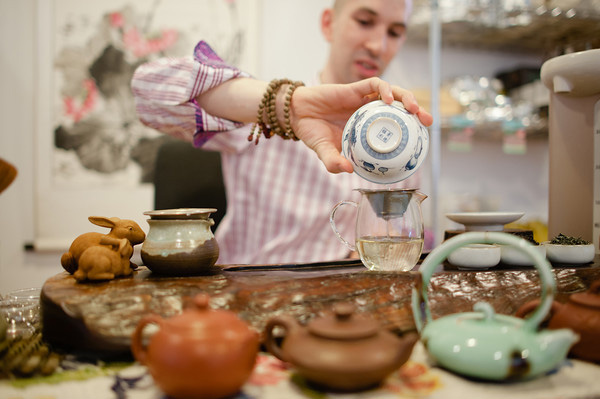
Most people who work with food or drink have a story behind their business.
David Duckler, founder of the import business called Verdant Tea, has dozens that we know about. There could well be hundreds.
Start talking with Duckler in his office on the third floor of a Warehouse District building and more likely than not, he’ll start serving you tea: cup after tiny cup of the stuff emerging from small pots like a river. As the water and tea flow — into, out of, and onto the pot and clay “tea animals,” and through a walnut tea board typical of the gongfu tea cermony — so do Duckler’s words.
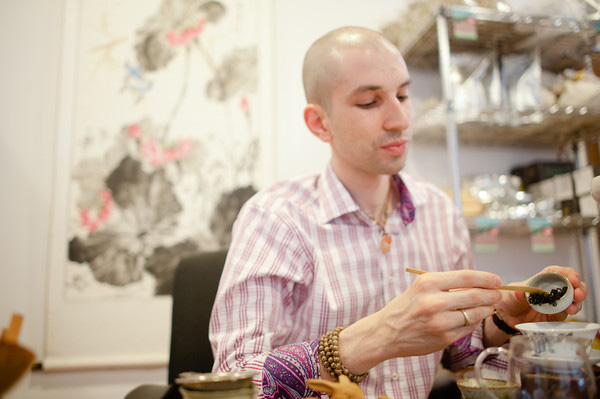
“One of the reasons I started Verdant Tea was to return the favor to the farmers who took me into their homes,” he recalls. Duckler’s origins as a tea importer spring from a trip to China where he studied, through Bard College, on a Fulbright scholarship focused on tea culture and folklore. Over the course of that trip and several others, he became acquainted with tea in one of the country’s newest and most unusual tea regions, and formed a bond with local farmers that is the heart of his business. Verdant Tea began in March 2011 and re-booted on a more ambitious scale in March 2012, with two full-time employees (including Duckler).
“There was this act of hospitality in sharing what [the farmers] were doing,” he recalls. “I tried coming back to America and giving talks about tea, and demoing tea and writing about tea, and doing videos. I found that I was missing the mark, and that what people needed was just to drink the tea! They needed to have it in their home and recreate that act of hospitality when a farmer invites me into their home and says ‘sit down, and drink a cup of tea with me.'”
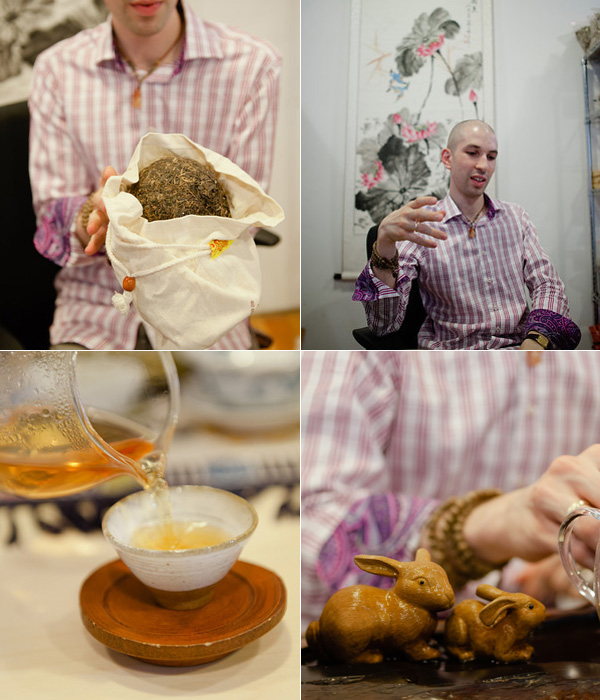
For Duckler, who speaks in full paragraphs that occasionally rise to the level of poetry, it is an article of faith that the tea must speak for itself. His product is an oddball rarity that comes from the oceanside Laoshan District of China, the northernmost place in China where tea is cultivated and an area with a meager 50-year history of growing the stuff. In China, Laoshan doesn’t rate mention alongside the historic tea-growing regions of the country, and the qualities of its tea — a malty richness, and a palpable, almost oatmeal like creaminess – defy expectations.
“Laoshan green tea has creamy, green bean qualities to it,” he says. “It’s got maltiness to it. It’s like you’re drinking a meal, or you’re drinking a place — in the best of ways. And that doesn’t fit in with ideas of what fine Chinese tea should be.”
“Bringing this tea to America has given it a new vibrant life, a place where it can be appreciated differently,” he says. “That’s not to say that Americans understand it better — that’s not true, I didn’t discover this tea, and Americans aren’t experts about China… it’s just that it hasn’t become famous yet in China except in the city of Qingdao [near the Laoshan District].”
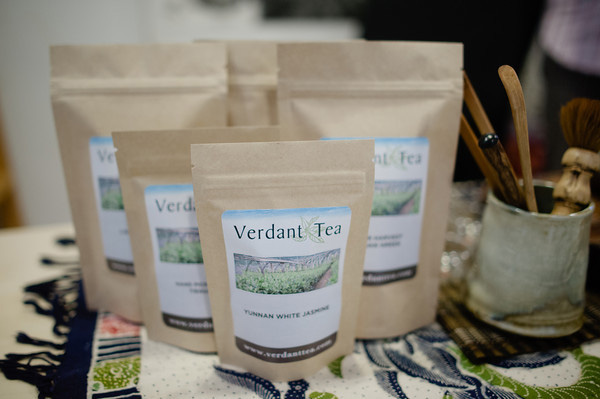
Laoshan teas rate highly on American online tea communities such as Steepster.com, where users praise the Laoshan Black, for example, with comments such as: “This is a solid 100 if ever I saw one. I’ve fallen hard and will be coming back for more,” “This is rich and wonderful,” and a simple “an excellent tea.”
The obscurity of the stuff, and its quirky but delightful flavor qualities (which depending on the variety can include surprising suggestions of chocolate, butter, or vegetables), make it an understandable obsession. Duckler works directly with farmers who grow tea using organic methods and imports his leaves via airmail. He thereby trades the expense of air freight and the challenge of developing personal relationships with his producers for the freshness of recently picked leaves and the satisfaction of doing business with people he considers personal friends.
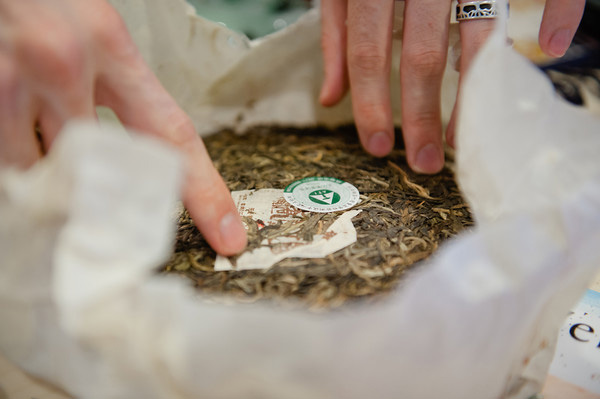
As Duckler explains it, the tea is more than a leaf — it’s a symbol of hospitality and tranquility. Every day while working through a Chinese language immersion program in Qingdao, he would pass a tea market, and find himself intrigued by the tiny pots and cups he’d see within it.
“I walked in and I thought it would be just like the jade market or the silk market where people immediately start yelling at you and say ‘Five quai! Five quai!’ You have to bargain with them, and it’s sort of a chaotic experience,” he says.
“But it wasn’t like that — it was very civil. Everybody was brewing tea in little tea pots … and the first shop I walked by, the owner said: ‘Please, sit down. Drink some tea.’ And I said: ‘Well, I don’t know if I want to buy anything,’ And he said: ‘That’s OK. Come drink some tea.'”
For him, the experience was profound: “…savoring small cups, appreciating the beauty of the objects, the smells — a total sense of immersion in a leaf. A humble leaf. That intrigued me.”
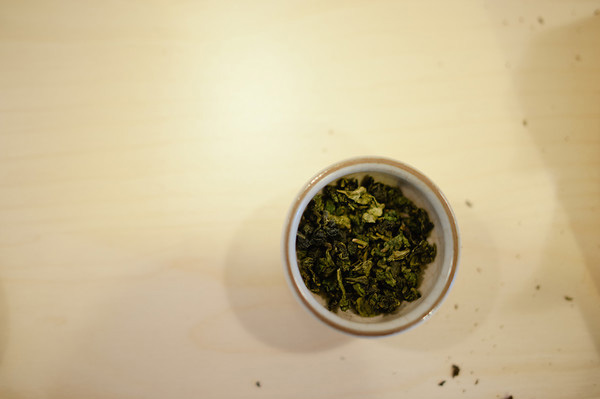
Duckler’s interest in the traditional Chinese belief systems of Taoism and Confucianism dovetailed with tea in surprisingly significant ways, he says, talking about both tea and Taoism’s relationship to “ideas about the cyclical nature of time, ideas about connecting to the natural way of things — the idea of trying to seek out whatever path makes the most sense, the idea of not resisting and not fighting but being more open to opportunities and enjoying the things in that moment.” As for Confucianism, the ritual of tea drinking is a natural physical analogue: it revolves around “humility, hospitality, and ritual.”
As for humility: Duckler tells a story of traveling to Hangzhou in China’s Zhejiang Province to study tea. “A taxi driver picks me up and says: ‘What are you doing in Hangzhou?’ Taxi drivers are really nosy in China — they just want to know everything about your life. And I said ‘I’m here to research tea and learn about tea culture.’ And he said: “That’s ridiculous! You flew all the way to Hangzhou from Qingdao to learn about tea culture? You are wasting your money. I’ll make you a deal. I’ll drive you around the city, charge you $10, take you back to the airport so you can go home and I’ll tell you everything you need to know about tea culture.'”
Duckler was committed to his trip, but he agreed to let the taxi driver tell him about tea culture. “He said: ‘All right, this is it. You take a cup … you have some water in your thermos…. you take some tea, you put the tea in the water. Drink it. That’s tea culture. You don’t need to know anything else.’ I thought: ‘Is this guy messing with me, or is he some kind of crazy tea sage who needed to teach me a lesson about humility and simplicity?'”
I have to remember: “What would the taxi driver say to me if he saw me right now? I don’t want to disappoint the taxi driver!”
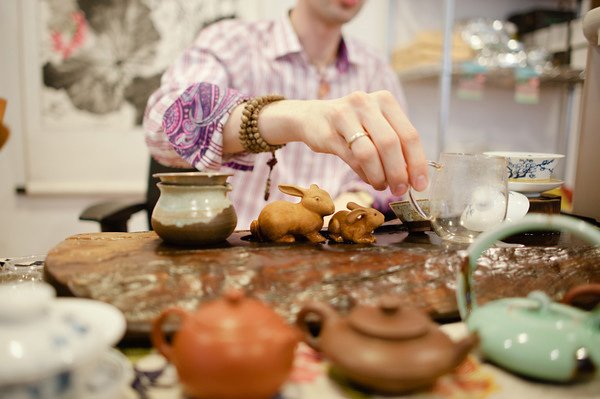
Duckler pours a final tiny cup of tea, holds it up, and considers it.
“The small cups are important for appreciating tea at this level,” he says. “In America, coffee has become a social scene — people get together and drink coffee. But inherently the gesture of drinking coffee, unless you’re drinking espresso, is hiding behind the mug. But the gesture of drinking tea out of these little cups — you’re not hiding behind it. And when you’re finished with it, I have an excuse to pour you more tea.”
Verdant Tea is available online at verdanttea.com, and on Saturdays at the Northeast Minneapolis Farmers Market and on Sundays at the Linden Hills Farmers Market.
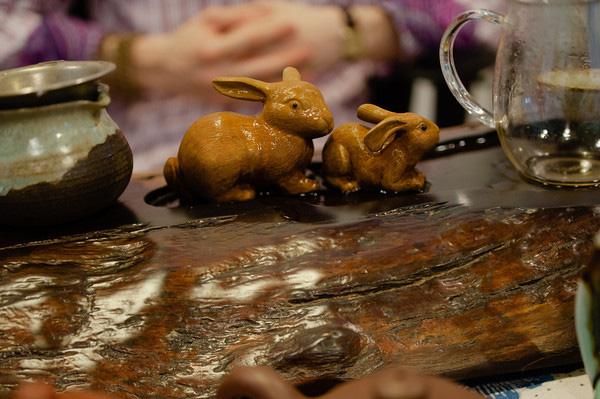

Proud to know a CEO in the top rank of tea importers. Have tasted your tea and have not been the same, since. Best to Lovely Lily.